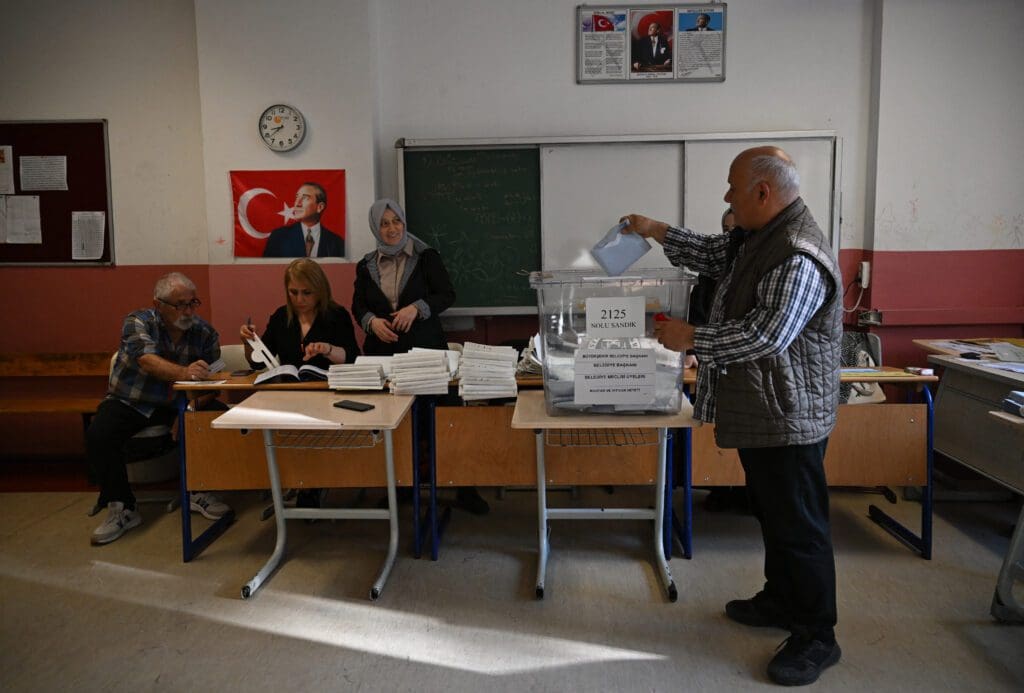1. In 2019, the leading opposition party, the Republican People’s Party (CHP), won mayoral elections in Türkiye’s three biggest cities—Istanbul, Ankara, and Izmir—marking the height of opposition unity under the Nation Alliance (Millet İttifakı). This time, despite the Nation Alliance’s dissolution, the opposition won even more cities in a landslide victory for the CHP not seen since 1977. What explains this striking reversal?
Türkiye’s recent municipal elections reflected a significant quest to counterbalance the government’s monopoly on power under the presidential system. The victory of the main opposition party (CHP) is significant, marking the first time it has prevailed since the Justice and Development Party (AKP) took power in 2002. Its success is noteworthy as it faced challenges, including the almost monopolized media landscape; state-run TV networks and news agencies favoring ruling party candidates; active support for AKP candidates on the campaign stage from the president and incumbent ministers; and the ruling party’s utilization of vast state resources during the local election campaigns across the country.
Notably, the absence of an official, united opposition platform did not prove detrimental in these elections, considering the Nation Alliance’s disintegration subsequent to its defeat in the May 2023 presidential and parliamentary elections. In the absence of an effective party to ally with the CHP, the Kurdish DEM Party formed an ad hoc alliance with the CHP at the district level. The DEM ran with its own candidates in major urban centers, such as in Istanbul, Ankara, and Antalya, but most of its constituency ultimately voted for the CHP mayors.
This victory showcases the CHP’s broad support beyond its conventional voter base, among the Kurds and conservatives, and is partially attributed to AKP voters who indirectly supported the CHP candidates by abstaining from voting. This contributed to a lower overall turnout in comparison to the previous election (78.7% and 84.7%, respectively). Since 2019, the AKP’s base has exhibited a consistent pattern of voicing discontent during local elections, notwithstanding their allegiance to the party’s leader, Erdogan, in national elections.
While the AKP has long capitalized on Türkiye’s lack of an effective opposition, the CHP recently changed leadership and entered these elections under the leadership of a young politician, Ozgur Ozel, overthrowing the old guard Kemal Kilicdaroglu. The popular mayors of Istanbul and Ankara have increased their support (11.5% and 28.8%, respectively). Istanbul Mayor Ekrem Imamoglu will potentially become the next presidential candidate in 2028.
2. Recep Tayyip Erdogan has led Türkiye for over two decades, first as prime minister and then as president. He was re-elected last May for another presidential term. A few weeks before the March 2024 local elections, Erdogan stated that the recent local elections would be his last. What do the results indicate for the fate of Erdogan and his Justice and Development Party (AKP)?
Many observers are questioning whether this election will really be Erdogan’s last, particularly considering his nationalist ally Bahçeli’s statement affirming Erdogan’s irreplaceability. This underscores the Nationalist Movement Party’s (MHP) dependence on Erdogan for their envisioned constitutional changes that are expected to steer Türkiye towards a more authoritarian and isolated path. However, the current constitution does not allow Erdogan to run for a third term in 2028, thereby elevating constitutional reform to a primary concern. A systemic change would be advantageous for Erdogan, also because winning elections in two rounds—securing 50% + 1 vote in the first round, and then in the second round amidst a multitude of political actors and dwindling support levels—is very unlikely.
Voter sentiments from AK Party’s base during the March 2024 local elections were influenced by a convergence of various factors. While economic concerns (such as the rising cost of living) were paramount, other issues may have alienated its voter base, including systemic justice and governance problems, the prominent presence of ministers on the campaign stage projecting an image of overwhelming power, the AKP’s candidate selection process, and even Türkiye’s inaction against Israel during the war on Gaza.
The AK Party fielded exceptionally weak candidates in the most crucial cities, including Istanbul and Ankara. The party’s candidate for mayor of Istanbul, former AKP minister Murat Kurum, has a public profile associated with the negative aspects of urbanization, while Ankara candidate Turgut Altınok’s image has been linked with concerns of inexplicable personal wealth. Despite them, Erdogan has been in the front seat—sometimes holding two public rallies a day, inaugurating public facilities, and never showing any sign of complacency throughout his decades of campaigning. Time will reveal how Erdogan and the AK Party will navigate defeat, respond to the election results, and negotiate potential changes with government and state allies.
3. In the lead-up to the elections, the Erdogan administration expanded Türkiye’s military operations in Iraq against the Kurdistan Workers’ Party (PKK). This behavior appeared to be an attempt to win the support of the nationalists in the country and bolster the government’s stance on security and foreign policy. Amid rising regional tensions and Israel’s genocide in Gaza, what influence did Ankara’s foreign policy have on the most recent local elections?
It is probable that Türkiye’s prevailing approach towards the PKK in Iraq and Syria will not change, as military strategies and operations will persist. While a major shift is not anticipated, there could be a potential softening regarding the Kurdish issue within Türkiye. A significant indicator of such stance would be the government’s actions regarding the democratically elected Kurdish mayors in eastern and southeastern Türkiye. Since 2019, trustees have been appointed, replacing all elected mayors of the Kurdish political party from that year and prosecuting many of them. As such, the DEM Party unsurprisingly gained 10 provinces and many districts in this election, but these gains may be undercut by governmental and judicial responses.
Furthermore, the elections also showed that the perceived wave of xenophobia in Türkiye, particularly against an estimated four million Syrians under temporary protection, may not be as substantial as was believed. Candidates, especially those advocating such sentiments, have not achieved significant success and the leaders’ victory speeches have not touched upon the populist issue of returning the Syrians. Notably, the party that campaigned against Syrians and held influence in presidential elections, the Victory Party (Zafer Partisi), received as low as 1.8% of the total votes in this election. Turkish society in general appears to prefer a rational and reasonable approach, although this has yet to translate into good policies, such as legal protection, non-discrimination, and integration support.
It is plausible to assume that the most recent voter disillusionment results from the ruling party’s conflicted position on Gaza. Not only has it failed to pursue legal intervention at the International Court of Justice, but it has hesitated to sever commercial ties with Israel. This perceived duplicity may have impacted the AKP voters’ impressions, thereby contributing to a general sentiment of discontent, as I previously argued. Conservative voters are reacting to the ongoing trade agreements with Israel, as indicated by growing support for the New Welfare Party, which increased its votes and won the significant conservative of Yozgat and Şanlurfa.
4. During a judicial crisis in November last year, Erdogan called for a constitutional overhaul. Now that his party has lost in the local elections, what could that mean for Türkiye’s constitution, remaining democratic institutions, and judicial independence?
The democrats in Türkiye hope Erdogan takes a lesson from this defeat in the municipal elections and returns to the path of democratization. Those who gain from authoritarian policies will hope and work for the opposite outcome. Despite the fact that it is premature to discuss this, it appears that the escalation—which prioritized securitization over democratization—has reached its peak. The price of this has been paid by all of Türkiye, including the AK Party’s own voter base, through unprecedented impoverishment. It is unlikely that Erdogan and his reform-minded cadre will fail to notice and grasp this reality.
Being an optimist, I would hope that Erdogan’s confidence in changing the constitution with his ultra-nationalist allies alone is now shaken. It is imperative to implement consensual methods. It is evident that Türkiye’s constitution does not satisfy all 85 million people and fails to strengthen democracy and unity. This discontent may pave the way for a new constitution with broader political participation and consensus. However, this situation requires not just Erdogan’s involvement but also that of the opposition and the wider public. Hence, opposition parties possess a golden opportunity to demonstrate their political will and vision for the future of Türkiye ahead of the general election in 2028.


